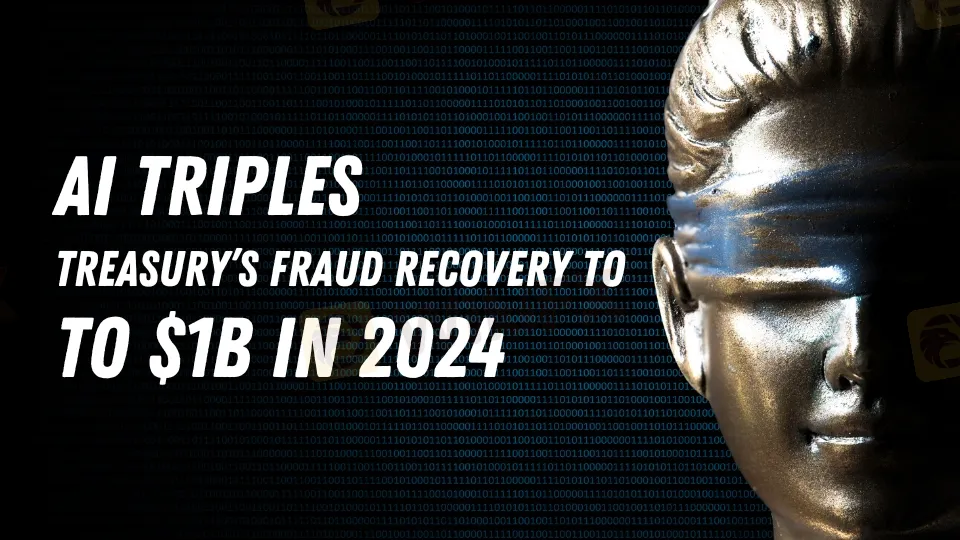简体中文
繁體中文
English
Pусский
日本語
ภาษาไทย
Tiếng Việt
Bahasa Indonesia
Español
हिन्दी
Filippiiniläinen
Français
Deutsch
Português
Türkçe
한국어
العربية
AI Triples U.S. Treasury’s Fraud Recovery to $1B in 2024
Abstract:The U.S. Treasury's use of AI for fraud detection leads to a significant increase in recovery, reaching $1 billion in fiscal 2024, thanks to machine learning.

The U.S. Treasury Department has achieved significant success in combating financial crime by adopting artificial intelligence (AI), recovering an impressive $1 billion in check fraud during fiscal year 2024. This marks a nearly threefold increase compared to the previous year and underscores the transformative role AI plays in fraud detection.
Treasury officials attribute much of this success to machine learning, which enabled the department to detect and prevent over $4 billion in fraud—a sixfold increase from the prior fiscal year. Renata Miskell, a senior Treasury official, emphasized that AI's ability to identify hidden patterns and anomalies in vast datasets has substantially improved the department's fraud detection capabilities.
The Treasury‘s journey into AI began in late 2022, aligning its efforts with the established practices of banks and credit card companies. Unlike generative AI models, which focus on generating text and images, the Treasury's system employs machine learning to analyze data and identify suspicious activity at speeds far beyond human capability. This speed is crucial, given the Treasury’s responsibility for managing an annual payment volume of around $7 trillion, including Social Security payments, tax refunds, and federal payroll.
The rise in fraud, particularly following the COVID-19 pandemic, has highlighted the importance of AI in protecting taxpayer dollars from scams. Despite these advancements, concerns about AIs potential misuse by bad actors have surfaced. Treasury Secretary Janet Yellen and other officials have warned about the risks AI could pose to the financial system.
In response, Miskell assured that human oversight remains a critical part of the process. Every flagged transaction undergoes a thorough review by a human before any determination of fraud is made, ensuring that AI enhances, rather than replaces, human judgment.
As the Treasury expands its AI initiatives, it is working with state agencies to improve fraud detection tools, especially in areas like unemployment insurance fraud. The IRS has also announced plans to use AI to identify tax evasion schemes, reflecting a broader trend among federal agencies to adopt technology for financial oversight.
Final Thoughts
The U.S. Treasurys successful integration of AI in fraud detection demonstrates the power of technology to strengthen financial security while highlighting the need for balanced human oversight. As fraud schemes grow more sophisticated, the continuous evolution of AI tools and practices will be essential to protecting taxpayer funds and maintaining trust in the financial system.

Disclaimer:
The views in this article only represent the author's personal views, and do not constitute investment advice on this platform. This platform does not guarantee the accuracy, completeness and timeliness of the information in the article, and will not be liable for any loss caused by the use of or reliance on the information in the article.
Read more

RM570,000 Lost in a Gold Trading Scam in Malaysia
In a distressing case of financial deception, a retired female teacher in Malaysia lost RM570,000 of her personal savings and pension to a gold trading investment scheme.

Many Social Media 'Investment Gurus' Are Scammers Preying on Malaysian Traders
Social media platforms have become breeding grounds for scammers posing as investment gurus, exploiting the growing interest in forex and cryptocurrency trading among Malaysians. Fraudulent "financial experts" often create the illusion of legitimacy by offering enticing stock analyses and promises of high returns.

Arumpro Capital Ltd Faces Regulatory Setbacks as CySEC Withdraws CIF Licence
The Cyprus Securities and Exchange Commission (CySEC) has officially withdrawn the Cyprus Investment Firm (CIF) licence of Arumpro Capital Ltd. The decision was finalised during a CySEC meeting on 11 November 2024, marking another chapter in the firm's ongoing regulatory challenges.

Trump Media in Talks to Acquire Crypto Firm Bakkt
Trump Media eyes a $150M all-stock deal to acquire Bakkt, aiming to expand its crypto presence. Bakkt's stocks surge 160% amid acquisition buzz.
WikiFX Broker
Latest News
Tokyo Police Arrest 4 for Unregistered FX Trading Scheme
BSP Shuts Down Uno Forex Over Serious AML Violations
ACY Securities Expands Global Footprint with South Africa Acquisition
Rupee gains against Euro
WikiEXPO Global Expert Interview: The Future of Financial Regulation and Compliance
DFSA Warns of Fake Loan Approval Scam Using Its Logo
Consob Sounds Alarm: WhatsApp & Telegram Users Vulnerable to Investment Scams
CySEC Revokes UFX Broker Licence as Reliantco Halts Global Operations
GCash, Government to Launch GBonds for Easy Investments
Bitcoin ETF Options Get Closer to Reality with CFTC Clarification
Currency Calculator


